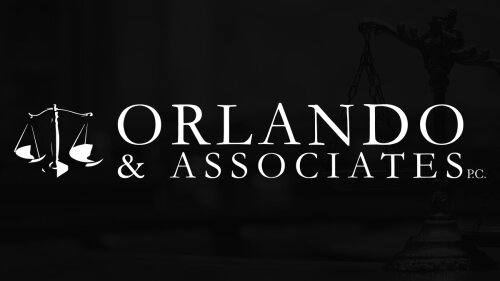Best Class Action Lawyers in Virginia
Share your needs with us, get contacted by law firms.
Free. Takes 2 min.
Or refine your search by selecting a city:
List of the best lawyers in Virginia, United States
About Class Action Law in Virginia, United States
Class action law allows a group of people who have suffered similar harm from the actions of a person, company, or other entity to join together and file a lawsuit as a collective group. In Virginia, a class action can address various issues such as defective products, employment disputes, consumer fraud, or environmental harm. These proceedings are designed to streamline the process for the courts and all parties involved, providing an efficient way for multiple plaintiffs to seek justice. Class actions in Virginia are primarily governed by Virginia's state laws, but certain cases may proceed in federal court under the Federal Rules of Civil Procedure.
Why You May Need a Lawyer
There are several situations where seeking legal help for a class action in Virginia is important. You may need an attorney if you believe that you, along with others, have suffered damages due to defective consumer products, misleading business practices, wage and hour violations, unfair insurance practices, or employment discrimination. A lawyer can help assess whether your case meets the requirements for a class action, handle communication with the court and other parties, and fight for the best possible outcome on your behalf. Additionally, experienced legal counsel is often crucial due to the complexity and procedural requirements of class actions.
Local Laws Overview
In Virginia, class actions can be filed under certain provisions of the Virginia Rules of Civil Procedure, particularly Rule 3:9, which outlines the conditions required for filing as a class. The fundamental criteria include numerosity (the class is so large that joining all members is impracticable), commonality (common legal or factual questions exist), typicality (claims or defenses of class representatives are typical of the class), and adequacy of representation (class representatives will fairly and adequately protect the interests of the class). Virginia also recognizes both state and federal class action lawsuits, so determining jurisdiction can be important. Notably, Virginia law has some differences from federal law, such as restrictive rules on certain types of class claims, making the guidance of a knowledgeable attorney even more vital.
Frequently Asked Questions
What is a class action lawsuit?
A class action is a type of lawsuit where one or several individuals represent a larger group who have similar legal claims against the same defendant.
Can I start a class action suit on my own in Virginia?
While it is possible to start a class action if you meet the criteria, class actions typically require significant legal expertise. Most are initiated with the help of experienced attorneys.
How do I know if I am eligible to join a class action?
You may be eligible if you have experienced harm similar to others from the same defendant and the case has been recognized as a class action in court.
What types of cases qualify for class actions in Virginia?
Common cases include defective products, consumer fraud, employee wage disputes, discrimination claims, and certain environmental issues.
Do I have to pay to join a class action in Virginia?
Most class actions are handled on a contingency fee basis, which means you do not pay up front. Attorneys are usually paid a portion of the awarded damages if the case is successful.
How are settlements or awards distributed in a class action?
After attorney fees and case expenses are deducted, the remaining funds are typically distributed to qualified class members based on the terms approved by the court.
Can I opt out of a class action?
Yes, class members are usually provided an opportunity to opt out of the lawsuit if they wish to pursue their individual claims separately.
How long does a class action case take in Virginia?
Class actions tend to take longer than individual lawsuits and may last several years, depending on the complexity of the case.
What is the difference between a class action and a mass tort?
A class action consolidates all claims into one lawsuit with class representatives, while a mass tort involves multiple individual lawsuits that are sometimes coordinated for efficiency.
Is there a statute of limitations for filing a class action in Virginia?
Yes, class actions are subject to statutes of limitations that vary based on the underlying claim. It is important to consult a lawyer to avoid missing critical deadlines.
Additional Resources
Virginia State Bar - Offers lawyer referral services and general legal information on group litigation.
Office of the Attorney General of Virginia - May provide information or updates on public class actions involving consumer protection.
United States District Courts in Virginia - Handles federal class action lawsuits impacting Virginia residents.
Legal Aid Societies of Virginia - May assist qualifying residents with legal questions or referrals.
Next Steps
If you believe a class action may be the right course for your situation, begin by gathering all relevant documents and records that support your claim. Next, reach out to a qualified attorney who specializes in class action or consumer protection law in Virginia. They can assess the details of your case, explain your rights, and help you determine if you should proceed as an individual or as part of a class. Taking prompt action is important to ensure you do not miss any legal deadlines. Be sure to ask any attorney about their experience with similar cases and what you can expect throughout the process.
Lawzana helps you find the best lawyers and law firms in Virginia through a curated and pre-screened list of qualified legal professionals. Our platform offers rankings and detailed profiles of attorneys and law firms, allowing you to compare based on practice areas, including Class Action, experience, and client feedback.
Each profile includes a description of the firm's areas of practice, client reviews, team members and partners, year of establishment, spoken languages, office locations, contact information, social media presence, and any published articles or resources. Most firms on our platform speak English and are experienced in both local and international legal matters.
Get a quote from top-rated law firms in Virginia, United States — quickly, securely, and without unnecessary hassle.
Disclaimer:
The information provided on this page is for general informational purposes only and does not constitute legal advice. While we strive to ensure the accuracy and relevance of the content, legal information may change over time, and interpretations of the law can vary. You should always consult with a qualified legal professional for advice specific to your situation.
We disclaim all liability for actions taken or not taken based on the content of this page. If you believe any information is incorrect or outdated, please contact us, and we will review and update it where appropriate.
Browse class action law firms by city in Virginia
Refine your search by selecting a city.









